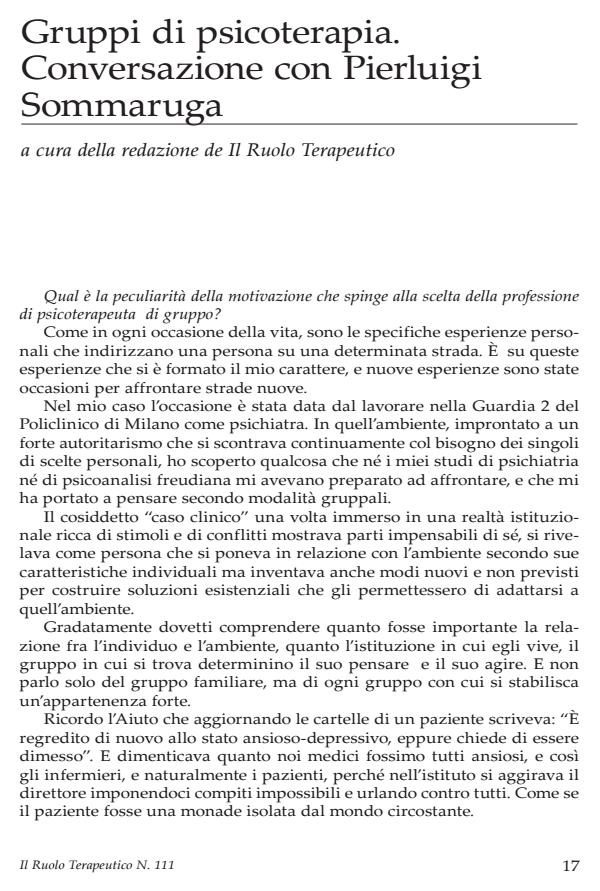Gruppi di psicoterapia. Conversazione con Pierluigi Sommaruga
Titolo Rivista RUOLO TERAPEUTICO (il)
Autori/Curatori
Anno di pubblicazione 2009 Fascicolo 2009/111
Lingua Italiano Numero pagine 14 P. 17-30 Dimensione file 261 KB
DOI 10.3280/RT2009-111004
Il DOI è il codice a barre della proprietà intellettuale: per saperne di più
clicca qui
Qui sotto puoi vedere in anteprima la prima pagina di questo articolo.
Se questo articolo ti interessa, lo puoi acquistare (e scaricare in formato pdf) seguendo le facili indicazioni per acquistare il download credit. Acquista Download Credits per scaricare questo Articolo in formato PDF

FrancoAngeli è membro della Publishers International Linking Association, Inc (PILA)associazione indipendente e non profit per facilitare (attraverso i servizi tecnologici implementati da CrossRef.org) l’accesso degli studiosi ai contenuti digitali nelle pubblicazioni professionali e scientifiche
Group psychotherapy. conversing with Pierluigi Sommaruga - Sommaruga is convinced that his personal experiences led him to group analysis. He has no doubts about defining his work with groups as being psychoanalytic. His theoretical orientation is modern relational psychoanalysis. He calls his way of working interpersonal psychoanalysis or group analysis, where the focus is on the single individuals without losing sight of what happen in the group. He emphasizes how his leadership style has changed over time: today he prefers to work with the relational models of the single members rather than with the group as a whole. He considers the transference in group analysis to be the reenactment of relational experiences with the opposite sex, with persons who had a particular role in the life of the patients, rather than with parental figures. The group seling contains a wealth of information and reveals unsuspected aspects of the patient’s relational world. He feels that the ideal criteria in forming a group is the selection of persons with similar problems, but with different ways of dealing with them so that the group is neither too conflictual nor too cohesive. This is an extremely delicate phase in which errors of evaluation by the therapist are possible. He feels that group treatment is possible only if the position of authority of the therapist is recognized. In the case in which it is not possible to resolve certain individual conflicts in the group, he proposes a series of individual sessions with the patient, avoiding the creation of two impermeable seings. He feels that the effectiveness of analytic group work becomes evident when the patients’ projects finally become realistic and realizable. He likes to think of the group as a space where new relational events can happen, in a continuous exchange between individuals and the group.
key words: group seling, group analysis, analyst style, confrontation, leadership modalities
, Gruppi di psicoterapia. Conversazione con Pierluigi Sommaruga in "RUOLO TERAPEUTICO (il)" 111/2009, pp 17-30, DOI: 10.3280/RT2009-111004